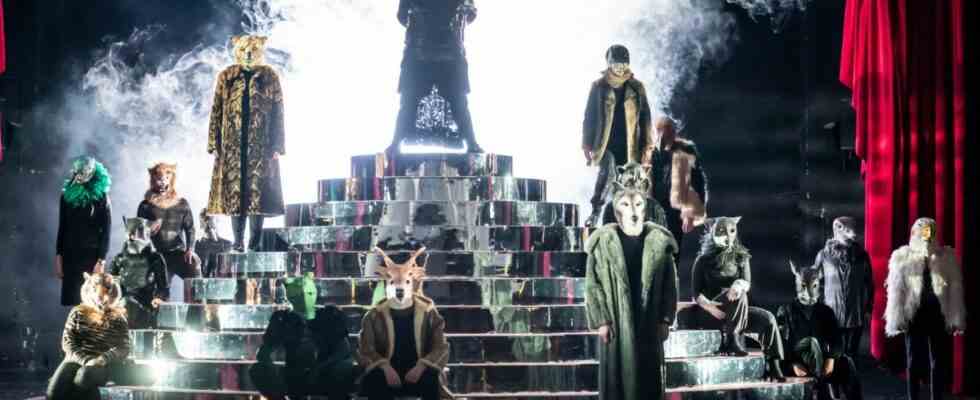The bat’s revenge is the theme of a Viennese operetta by Johann Strauss that premiered in 1874. Since the conviction arose that the Covid epidemic began with a virus jump from this animal to humans, the “revenge of the bat” has also been a metaphor for nature’s defensive war against the two-legged creature, which destroys the living world for its fat lifestyle. Developing a drama from this point of contact is an original combination that has now been brought out at Hamburg’s Thalia Theater with a kind of Apocalette by Anna-Sophie Mahler.
The busy Austrian poet of defeatist prophecies Thomas Köck wrote a text for it from the perspective of extinct animal species, but at the time when Homo sapiens already belonged – as the only race out of their own stupidity. “The species extinction of possibilities is already taking place,” it says, looking back on our present: “We are the witnesses of the downfall.” And because people find it difficult to digest such insights, the first thing that begins is: “Music!”
This speech is delivered in the spirit of the “last generation” by a “harlequin frog” with a helium voice in the last minutes of his life. This was probably inspired by the cell closer named Frog in Strauss’ operetta. Only this amphibian, played by a frog-like masked Cathérine Seifert, is not a comedian at all, but a deadly serious cell lockress of hope. As an acutely endangered species of slipper, the harlequin frog has nothing to laugh about, and that’s why his interjections stick scandalously to Prince Orlofsky’s funny masked ball and overwhelm the comedy with animal death stories.
The veil of anxiety hardly lifts from the singing Gaudium
Since the funny characters from Strauss’ infidelity entertainment also wear animal masks in Pascale Martin’s costumes (or are animals, that remains open), the veil of anxiety can hardly be lifted from the singing Gaudium. Only the brilliant Felix Knopp as the main character Gabriel von Eisenstein pulls out all the stops of the most glorious silliness with which man makes himself forget what a ruthless warrior of the scorched earth he actually is. But otherwise there is little humor, slapstick, punch lines or lightness in this adaptation of the original libretto, which deals with revenge for an embarrassing exposure.
Mahler’s very static directing around a reflective stair cake (stage: Katrin Connan) visibly struggles to create a coherent connection between the malicious lard of the waltz king and the heavy message, which actually only succeeds once. When stage and hall sing together the greatest hit that came out of “Fledermaus”, ambiguity suddenly becomes apparent. Because the great hit “Happiness is who forgets what cannot be changed”, in which Strauss enriches healing wisdom against depressive brooding with an optimistic melody, sounds like the blank as a chorus of extinct animals from the future perspective of a lifeless world A mockery of our luxury society, which closes its eyes to impending doom.
In singing, this less than two-hour revenge on ignorant confidence is at its most vital. Gabriela Maria Schmeide and Victoria Trauttmansdorff as Rosalinde and Adele perform their pieces from the operetta that has meandered to all opera houses in the world (by the way, Gustav Mahler performed it for the first time at an opera house in Hamburg in 1894) with fervor, melancholy or boldness, as they do the “Fledermaus” arias to demand. The American-Russian actor and countertenor Odin Biron, who worked on Kirill Serebrennikov’s Gogol Center in pre-war Moscow, may only strut around in exaltation as the princely fox, but sings heartbreakingly.
And Felix Knopp makes you want more concerts in every scene, were it not for the disturbing truths about the Algerian gazelle, the Pemperton deer mouse and the Santa Cruz rice rat, about the Himalayan quail, the kangaroo island emu and the Kiritimati -South sea runner. All eradicated by man, for shoes, steaks, farmland, mines, tourism or city building. This constant descent into the Valley of False Tears ends with Mozart’s “Lacrimosa”, sung by the “Klub Konsonanz” choir, into a real mourning song on the desolate planet. However, the Requiem only reconciles the never really connected parts of this staging concept through emotion. And that’s when it hums when you leave this nocturnal apocalypse: Happy is he who forgets what cannot be understood.

